After having been blessed with well-behaved clouds for the three days that followed our departure from Freetown, the rain finally seems to catch up. We had a bit of it on the way to Tiwai Island yesterday, and must now get to the border. We have no more cash and no more buffer time before Johannes’s visa expiry date.
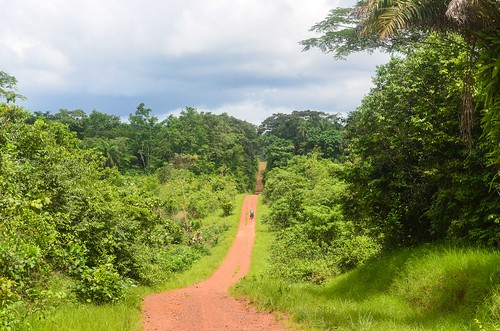
The roads are not terribly hilly, yet never flat. It is like riding a never ending rollercoaster (without the cogwheel to take us uphill). It is much better than yesterday, after the rain, where each depression was filled with water. The dry sky doesn’t last and we make it back wet on the main “road” in Potoru.
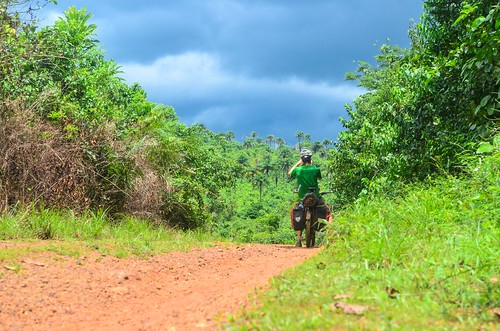
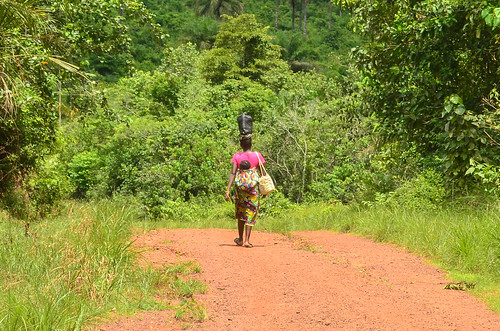
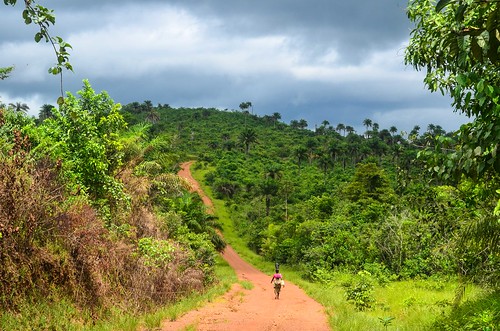
Despite the rain, the road remains a beautiful jungle with lively palm trees under the black sky. The surface keeps worsening. Some drivers are dangerously irresponsible, wanting to engage in conversation while driving (and while I’m struggling uphill watching carefully where to cycle between the rocks and the mud). I have heard many times that the west of Sierra Leone has lots of diamond mines, but I have yet to see them. I’d like to visit something similar to the Cullinan diamond mine of South Africa.
After Potoru, we cycle through a rubber plantation. The trunks look like they have been whipped and beaten up, but still stand like an army of scarred soldiers.
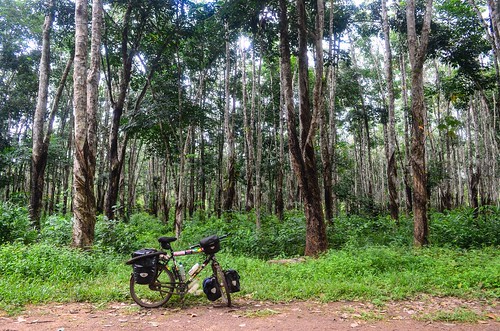
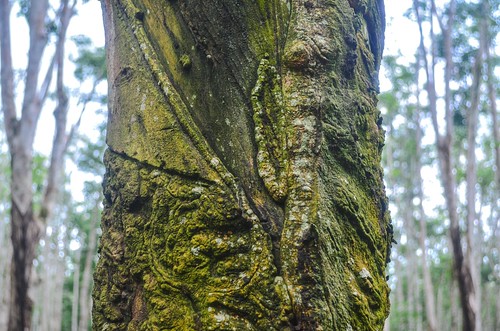
My low rider front pannier rack is not very suited to those roads. When I take small paths or try to avoid mud pools by cycling on the side of the roads, the panniers often hit some branches or the edge of the road (since the grass is higher than the track) and jump out of their clips.
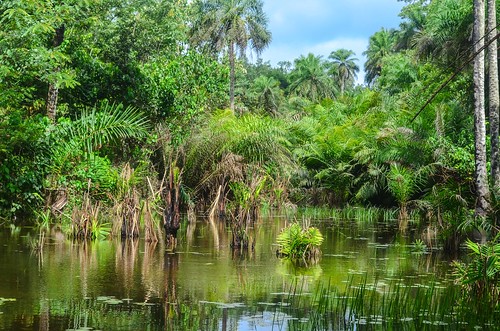
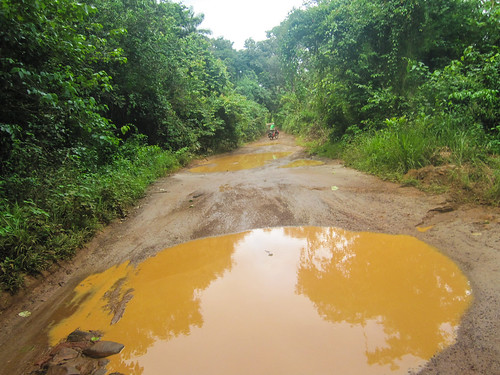
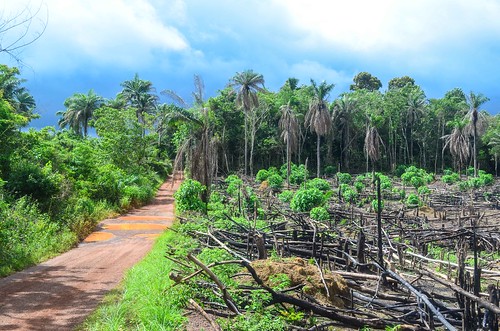
A village selling something different than old cookies, cigarettes and petrol, is always a good surprise.
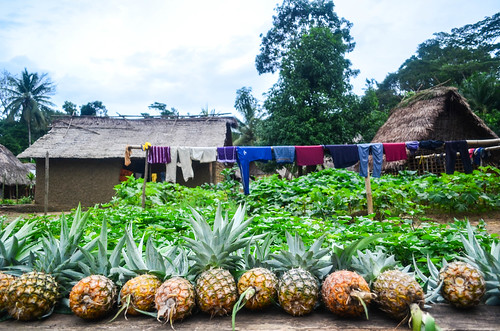


We have to take a cable ferry to cross over the Moa river, that same river that surrounds the Tiwai Island a few kilometers upstream. Once again we fail to spot the rare pygmy hippos …
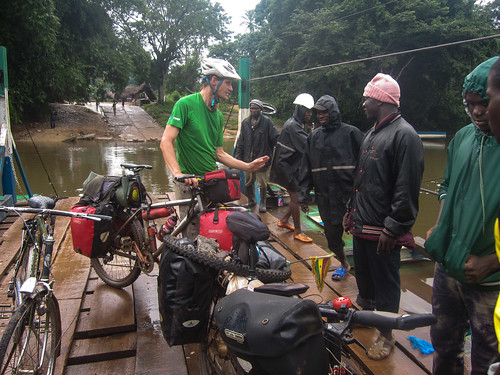
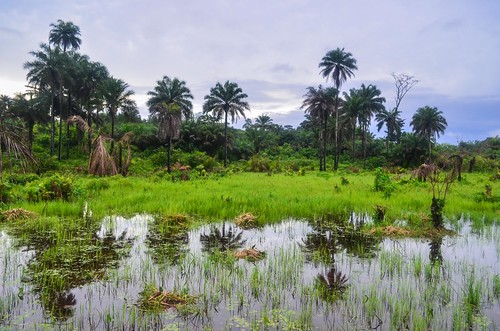
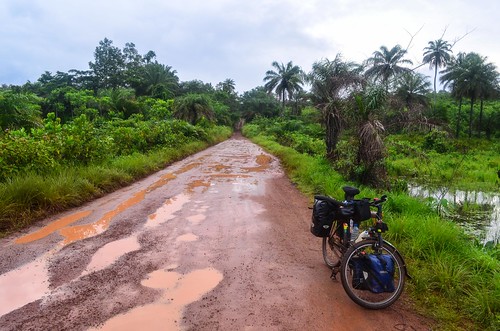
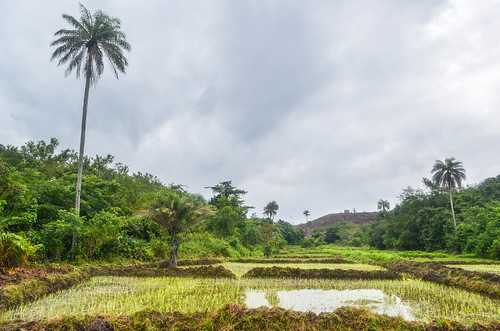
We arrive in Zimmi in the late afternoon. Zimmi is indeed along the border with Liberia, but the road and the border posts are in Jendema, some 45 kilometers further. There is a second minor border crossing north of Zimmi, but the major road is bad enough and we don’t know what is happening on the Liberian side of that border post. The Jendema border closes at 6 pm anyway. Considering our slow pace on these muddy roads, we keep it for tomorrow and check into the hostel. We are the only clients (as very often in rural areas) and treat ourselves with electricity. We buy for 12000 leones (2€) of petrol for the generator and it lasts for about 4 hours, just enough to charge all of our batteries.
The 45 kilometers until Jendema should be easily doable in a day and this is our target. But that is without thinking of the several forced pauses due to the rain. It rains three times over us, and by the time we reach the next village to shelter, we are quite wet already. But since we are drying quickly, there is not much difference between riding in the rain or not. It is not a heavy one.
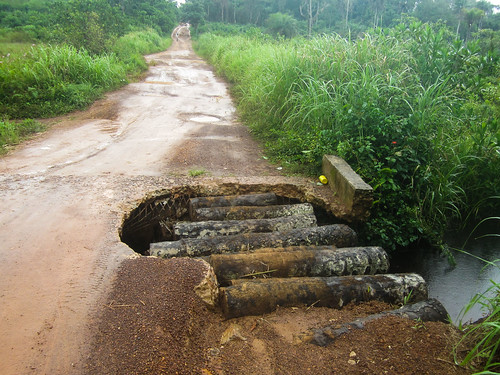
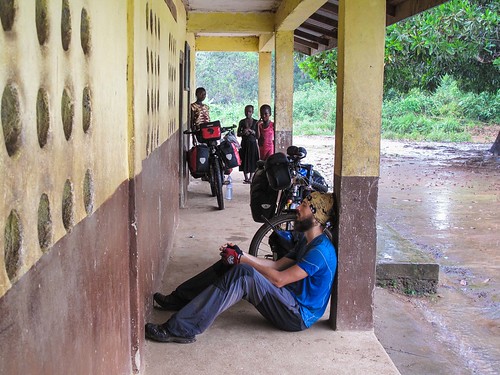
When I hear voices in the jungle behind some trees, I go exploring for a little while, with the hope of finding those famous diamond mines. I am not that comfortable walking on a narrow trail where snakes and scorpions are surely hiding. I only find man-made pools of water on the side of the river, with traces of recent activity. I cannot reach the voices as I would have to get wet for it, so I assume with disappointment that this is the famous diamond mining of the country of Blood Diamond. I wanted to see huge open pits and giant machines, but it is maybe not the right area, or the right year.
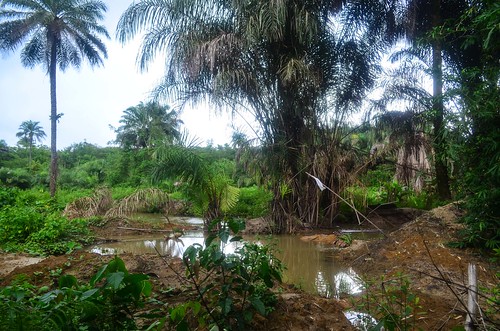
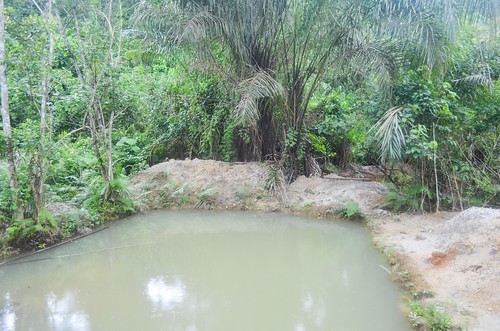
The road is one of the worse I have taken so far, but apart from the speed, it goes well. The machiavellian combination of the wrong mud with the rain is not impacting the road enough to clog in my wheels. In this case, cycling this unintended popular Zimmi – Jendema road is much better than trying it with a car, where the risk to get stuck is higher.


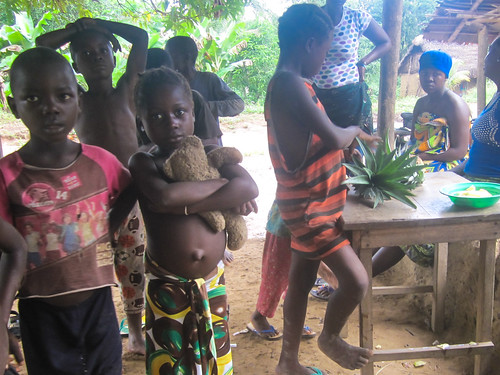
There are actually two men with one shovel working on the road. They are digging a trench near the depressions where the water floods the road and forms a big pool. They shovel just enough to evacuate some water, making the big pools smaller. Just enough for the cars to cross them without drowning the engine. Just enough to say that the road is not impassable.
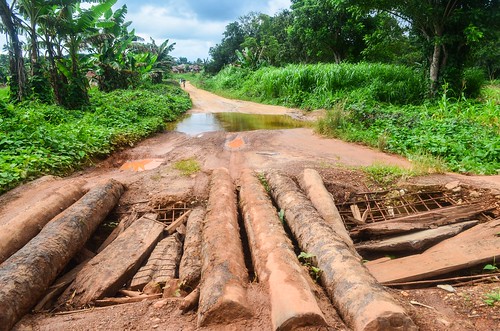
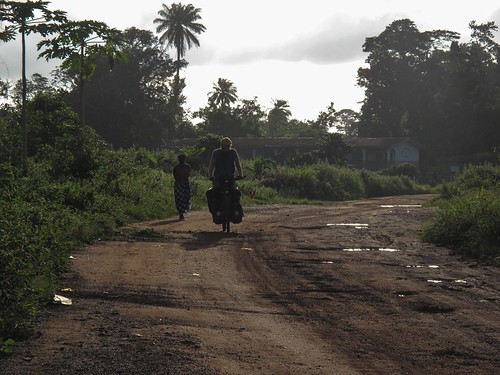
With our speed, we can barely make it to the Jendema border before the night. Since it is closing at 6 pm, we decide to sleep 4 kilometers ahead, in the small village, where we spotted a big house in construction. We are granted the authorization to camp inside by Massa, the owner, who also has to ask the permission to the chief of the village.
The fireflies are flying around at night time while we shower in a clean stream. We are too tired and fall asleep without dining.
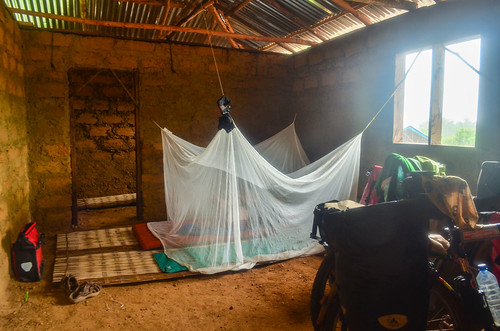
It has rained during the whole night. The loud noise of the rain hitting the metallic roof sheets interfered with my sleep but didn’t prevent me to complete a much needed 12-hour night. I slept badly the previous night at the hostel. Sleeping in a hostel/guesthouse is worse then sleeping outside for the sleep quality: people knock on doors early morning just to check on us, make loud phone calls or try their different cellphone ringtones just behind the door. Like privacy, the respect of someone’s sleep doesn’t exist. On the other hand, it is common to see people sleeping at their shops, in their field, next to their truck, anytime during the day. But poor nights and fully cycled days make quickly the body weak.
Our problem of the day is that it is still raining, the sky is uniformly overcast, leaving us without much hope. Massa says it will certainly pour down for the whole day, before heading to work. He teaches in Jendema and does the 4 km walking in the rain.
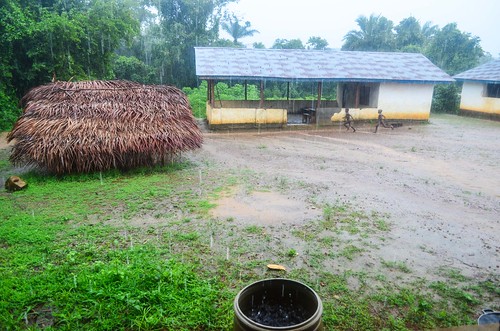
The kids seem to have a lot of fun in the rain while we wonder when we should leave. Johannes’ visa is expiring today, so we will have to cycle, at least the 5 kilometers until the other side of the border.
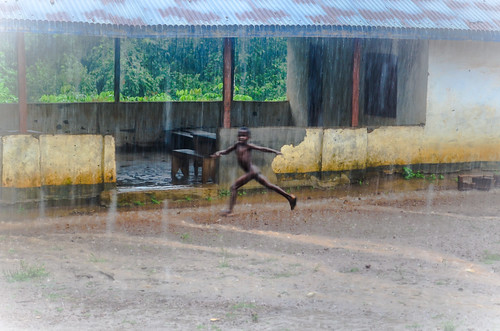
Massa comes back from work and we are still watching the rain. We kill time with spaghetti and bike cleaning.
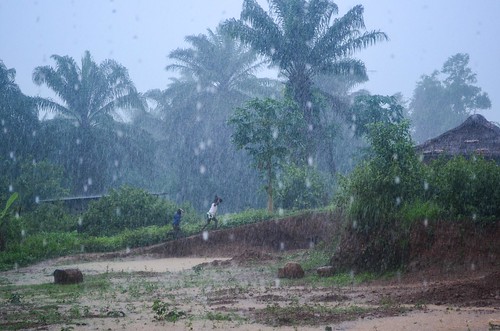
At 2 pm, the rain intensity weakens, the ambient luminosity gets stronger, and we seize the opportunity to leave.
The road has improved in the last kilometers, but our first downhill ends in a mini-lake with no alternatives.
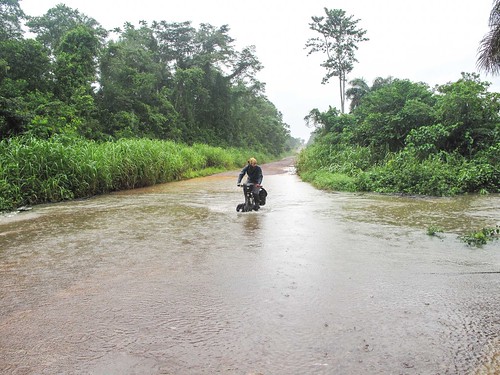
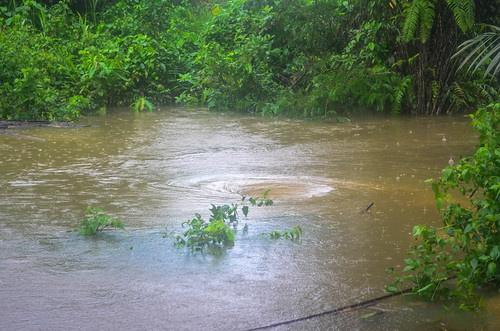
We are soon in Jendema and the rain leaves us alone. We feel lucky one more time for this full day of rain to be happening now, and not 2 or 3 days ago. In that case we would have really suffered. Once on the Liberian side, the road should be paved and easy.
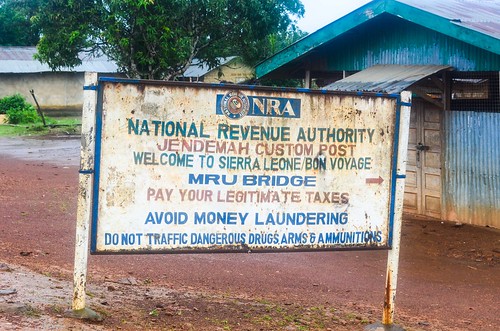
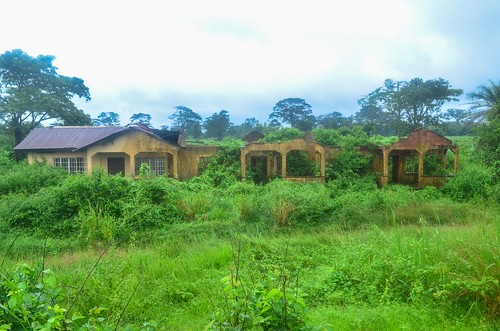
There are several police checkpoints within a small distance, and they take advantage of being in a border area to ask us many questions, but without stamping our passports. We finally get to the official immigration building of Sierra Leone, just before the bridge to Liberia.
While a young officer makes the usual joke of wanting to see the registration documents for our bicycles, the old chief takes us to his office to stamp our passports. He proudly displays a souvenir poster of Otto, the famous German globetrotter SUV that passed here 2 months ago. Once we are done, the young officer is back on the offensive and wants to see the documents for our bicycles. This is a common trick that the officers would try at borders. They are used to annoy vehicle drivers with finding something wrong in the required documents (car registration, carnet de passage, etc) and must feel powerless not being able to extort a bribe from cyclists.
He is looking serious and forces us to enter his office. We all know, him, his boss, and us, that he just expects a little present as a substitute for the documents we are not able to produce (because they simply do not exist). Actually, I have with me the proof of purchase (that I was told to keep with me in case the Swiss customs do their job too well …), but it wouldn’t solve the problem for the two of us. The young officer is stubborn and threatens to seize our bicycles and to call the police. His boss smirks in front of us. They probably realized that we won’t give them anything, but the young man keeps asking for registration documents for 10 or 15 minutes, and justifies himself with arguments that make less and less sense.
It is turning into a very silly and irritating conversation. He probably doesn’t want to lose the face and I start doubting about how far can this ridiculous movie scene go. He finally changes strategy and asks for pictures of our bicycles at the beginning of our respective trips, which we have. He is fine with that and lets us go. Zealous officers can be so annoying, they know they have full powers, and our only weapon (since we won’t give any bribe) is patience.
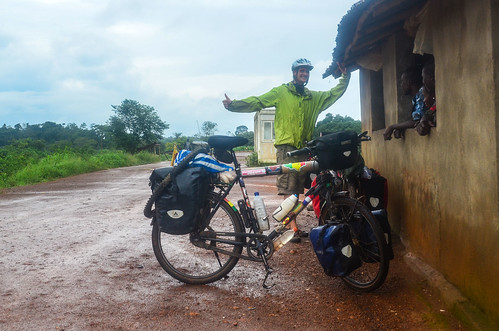
Done with Sierra Leone! It was a rather nice and welcoming country, with joking and friendly people, offering incredible hospitality despite being just recovering from a civil war. But this ultimate experience kind of spoiled our general impression. As soon as we pass the bridge, the asphalt appears, and we are ready for another country emerging from a war: Liberia.
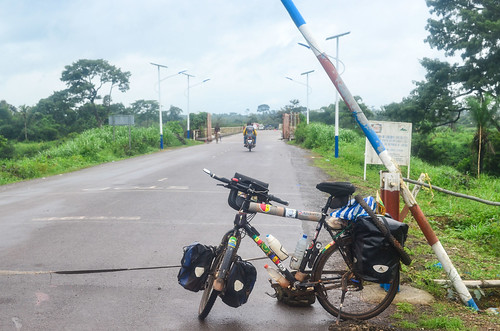







Nice, well done. I used to cykle round the Freetown penisula between 2001 -4 and it was amazing. U got some nice pictures there…
Hello what is sierra leone like